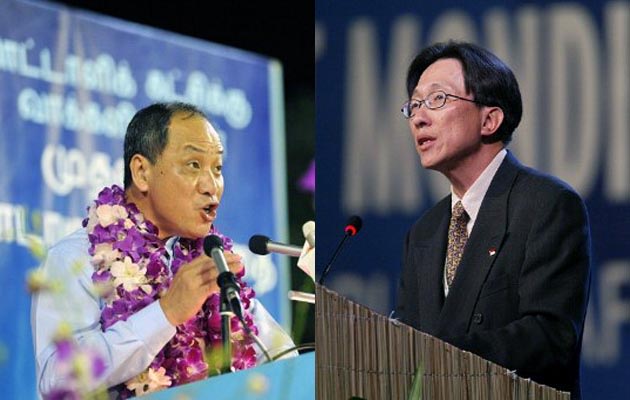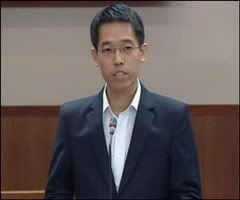Low: Better, faster and perhaps cheaper ministers?

Workers' Party chief Low Thia Khiang and Labour chief Lim Swee Say from People's Action Party (PAP) locked horns during the final day of the 12th Parliament's first meeting on Friday.
As the last speaker to speak from the opposition bench, Low -- the MP for Aljunied GRC -- took aim at Minister Lim Swee Say’s oft-repeated slogan of “cheaper, better, faster” and said that “perhaps we will start to see better, faster ministers at work and perhaps cheaper (ones) after the ministerial salary review is completed”.
He also urged the government to ask itself why Singaporeans commonly perceived the government to be "more concerned with paying its ministers well than about the welfare of the people."
In reply, Lim – who is the Minister in the Prime Minister’s Office as well as chief of the NTUC labour movement —said that his “cheaper, better, faster” slogan was referring to products and services and that comparisons were unfair.
“There’s a fundamental difference,” he said in his speech. “What the NTUC and the tripartite partners and pursuing are cheaper, better, faster products and services, and a cheaper, better, faster economy, not a cheaper, better, faster workforce.”
The East Coast GRC MP also said he was at a loss for words when Low said he felt that ministers served out of self-interest, accusing opposition MPs of taking credit for "the good things" that the government has done since the May General Election by saying that the presence of opposition MPs have brought about policy changes.
Separately, Low also urged the People’s Action Party to refrain from using “doom and gloom” scenarios when debating health care and welfare policy trade-offs.
“I urge the PAP to step out of the shadow of doom and gloom of certain pitfalls of Western liberal democracy and work towards a First World Parliament in our own way,” he said.
Low was defending Non-Constituency MPs Gerald Giam and Yee Jenn Jong's earlier calls for the government to spend on affordable and adequate health care, housing and retirement financing.
Both NMPs were then reminded by Minister of State for Trade and Industry and National Development, Lee Yi Shyan, of the pitfalls of a welfare state, citing the example of a debt-ridden Greece and its welfare system.
In rebuttal, Low said "it is high time the PAP MPs refrain from using this as a red herring to kill debate on alternative solutions and mechanisms to those proposed by the government."
Low added that the government had used the term "policy trade-offs" to defend decisions that benefited them instead of the people. Low gave the example of the decision to build the integrated resorts with casinos and the government "highlighted the benefits to our society over the related gaming and social ills -- never mind the trade-offs," said Low.
Low however did commend the PAP for its "resilience in response to ground reaction" and added that it was not the opposition MPs, but rather the voters that should really claim the credit for recent changes as they had voted more opposition in and that the result is that the PAP takes a serious look at what is happening.
Both Lim and Low also eventually agreed that national interest would remain above their own partisan ones.
<object style="height: 390px; width: 640px"><param name="movie" value="http://www.youtube.com/v/AV2L7D7J-mY?version=3&feature=player_detailpage"><param name="allowFullScreen" value="true"><param name="allowScriptAccess" value="always"><embed src="http://www.youtube.com/v/AV2L7D7J-mY?version=3&feature=player_detailpage" type="application/x-shockwave-flash" allowfullscreen="true" allowScriptAccess="always" width="640" height="360"></object>

Workers' Party chief Low Thia Khiang and Labour chief Lim Swee Say from People's Action Party (PAP) locked horns during the final day of the 12th Parliament's first meeting on Friday.
As the last speaker to speak from the opposition bench, Low -- the MP for Aljunied GRC -- took aim at Minister Lim Swee Say’s oft-repeated slogan of “cheaper, better, faster” and said that “perhaps we will start to see better, faster ministers at work and perhaps cheaper (ones) after the ministerial salary review is completed”.
He also urged the government to ask itself why Singaporeans commonly perceived the government to be "more concerned with paying its ministers well than about the welfare of the people."
In reply, Lim – who is the Minister in the Prime Minister’s Office as well as chief of the NTUC labour movement —said that his “cheaper, better, faster” slogan was referring to products and services and that comparisons were unfair.
“There’s a fundamental difference,” he said in his speech. “What the NTUC and the tripartite partners and pursuing are cheaper, better, faster products and services, and a cheaper, better, faster economy, not a cheaper, better, faster workforce.”
The East Coast GRC MP also said he was at a loss for words when Low said he felt that ministers served out of self-interest, accusing opposition MPs of taking credit for "the good things" that the government has done since the May General Election by saying that the presence of opposition MPs have brought about policy changes.
Separately, Low also urged the People’s Action Party to refrain from using “doom and gloom” scenarios when debating health care and welfare policy trade-offs.
“I urge the PAP to step out of the shadow of doom and gloom of certain pitfalls of Western liberal democracy and work towards a First World Parliament in our own way,” he said.
Low was defending Non-Constituency MPs Gerald Giam and Yee Jenn Jong's earlier calls for the government to spend on affordable and adequate health care, housing and retirement financing.
Both NMPs were then reminded by Minister of State for Trade and Industry and National Development, Lee Yi Shyan, of the pitfalls of a welfare state, citing the example of a debt-ridden Greece and its welfare system.
In rebuttal, Low said "it is high time the PAP MPs refrain from using this as a red herring to kill debate on alternative solutions and mechanisms to those proposed by the government."
Low added that the government had used the term "policy trade-offs" to defend decisions that benefited them instead of the people. Low gave the example of the decision to build the integrated resorts with casinos and the government "highlighted the benefits to our society over the related gaming and social ills -- never mind the trade-offs," said Low.
Low however did commend the PAP for its "resilience in response to ground reaction" and added that it was not the opposition MPs, but rather the voters that should really claim the credit for recent changes as they had voted more opposition in and that the result is that the PAP takes a serious look at what is happening.
Both Lim and Low also eventually agreed that national interest would remain above their own partisan ones.
<object style="height: 390px; width: 640px"><param name="movie" value="http://www.youtube.com/v/AV2L7D7J-mY?version=3&feature=player_detailpage"><param name="allowFullScreen" value="true"><param name="allowScriptAccess" value="always"><embed src="http://www.youtube.com/v/AV2L7D7J-mY?version=3&feature=player_detailpage" type="application/x-shockwave-flash" allowfullscreen="true" allowScriptAccess="always" width="640" height="360"></object>
Last edited:




































